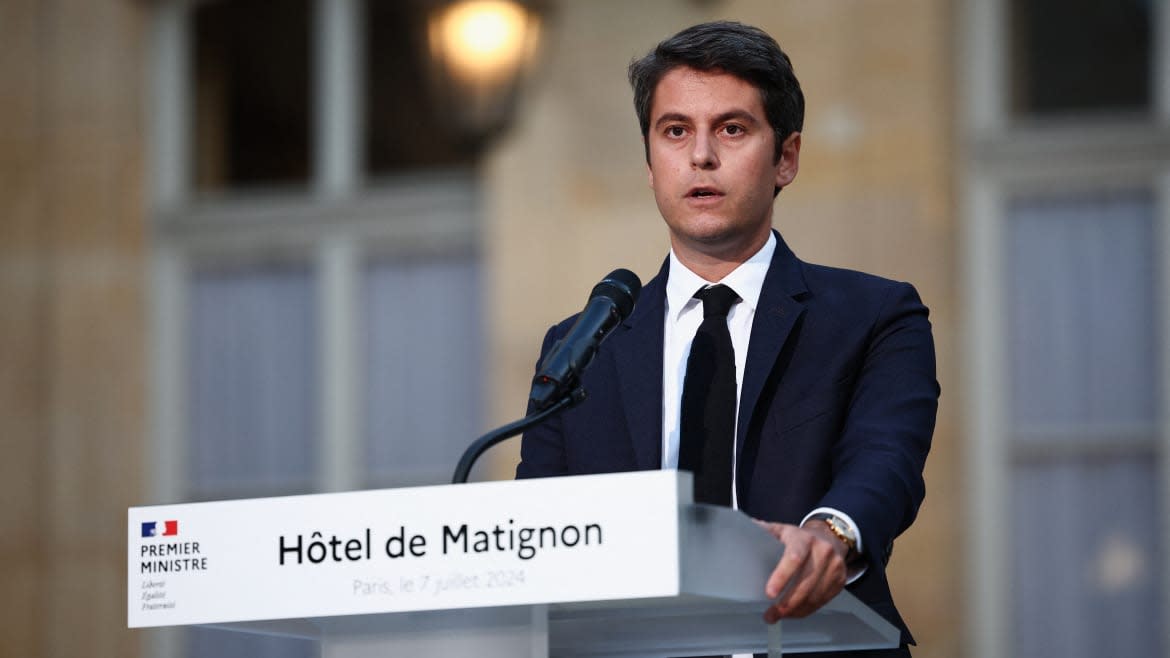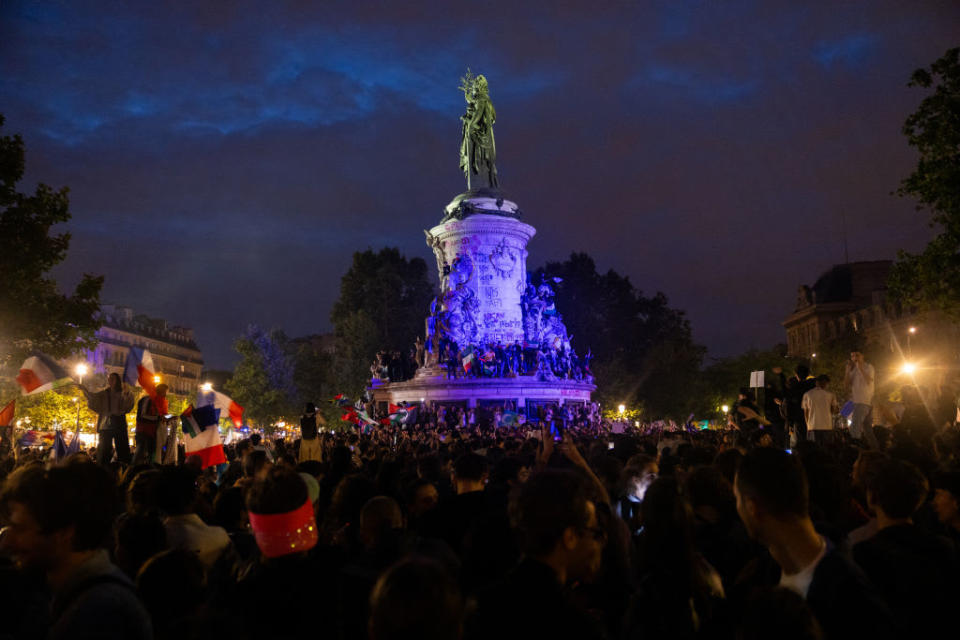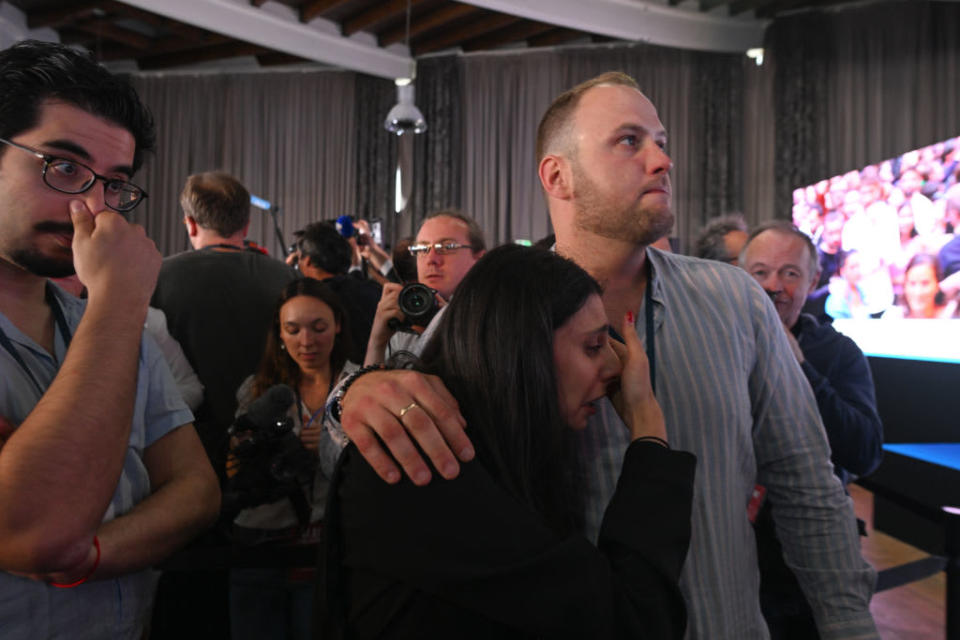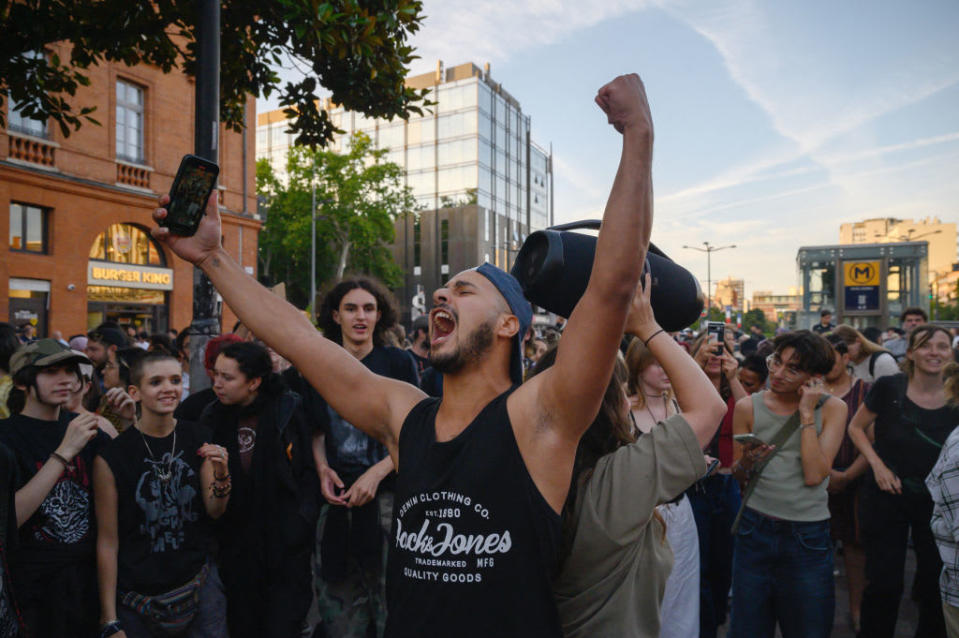French Prime Minister to Resign After Shocking Defeat for Far Right

- Oops!Something went wrong.Please try again later.
- Oops!Something went wrong.Please try again later.
- Oops!Something went wrong.Please try again later.
A left-of-center coalition beat out Marine Le Pen’s far-right National Rally in France’s second round of parliamentary elections Sunday, shocking politicians and pundits alike. But with no party winning an absolute majority, the country has been plunged into an uncertain state of political gridlock that could stretch on for months.
The alliance, the New Popular Front, won at least 181 seats, according to the Associated Press, which cited France’s Interior Ministry. Meanwhile, Macron’s centrist bloc slid into second place with at least 160 seats, while National Rally took a measly 143 seats.
Final results were still being tallied on Sunday night, with precise totals expected to be announced on Monday.
French Prime Minister Gabriel Attal said he would resign on Monday morning, the expected move given that Macron’s centrist coalition fell short of an absolute majority of 289 seats.
“I know that, in light of the results of this evening, many French people feel a certain uncertainty about the future, as no absolute majority has emerged [in parliament],” Attal said, according to CNBC. “Our country is experiencing an unprecedented political situation.”

Supporters of the left wing union, the New Popular Front, gather at the Place de la Republique following the defeat of the far-right in France's legislative elections.
Appointed by Macron just six months ago, Attal said that, if asked by the president, he would remain in office until a new government could be formed.
But it was unclear on Sunday night how long that might take. To effectively run the French government, Macron will have to form alliances, though he has said he will not negotiate with firebrand leftist Jean-Luc Mélenchon.
The Times of London reported that Macron plans to wait for the full picture to emerge before making any necessary decisions.
“The president, as guarantor of our institutions, will respect the choice of French people,” a statement from the Élysée Palace read.
Mélenchon, for his part, called the results an “immense relief for a majority of people in our country,” according to the AP.
He also called on Macron to appoint a prime minister from the NFP, invite it to form a government, and get down to the brass tacks of implementing the bloc’s agenda.
“The president must bow and admit this defeat without trying to circumvent it,” Mélenchon said, according to The Washington Post.
The NFP’s program includes lowering the retirement age raised by Macron last year; roll back his controversial pension reforms; reform green and agricultural policies; and increase government spending on everything from health care to environmental protections.

Young supporters of the far-right National Rally party react to results of the second round of the French parliamentary elections Sunday.
The coalition was hastily jury-rigged together less than a month ago, a few days after President Emmanuel Macron called snap elections. It is made up of a France’s four main leftist parties, including Mélenchon’s France Unbowed and the more moderate Socialists, as well as a handful of smaller blocs.
Macron called the elections after his coalition was thrashed by National Rally in the European parliamentary elections last month, hoping that French voters would turn out to reject the specter of a far-right government.
The risky move backfired spectacularly in the first round of voting, however, with National Rally and its allies clawing in 33 percent of the vote. The NFP won 28 percent, while Macron’s alliance trailed with 20 percent.
With those results firmly in place, no one expected the left’s come-from behind upset victory on Sunday. As it became increasingly clear, however, a dismal gloom settled in on the other side of the aisle.
“Party apparatchiks talked in hushed tones of indications they had fallen short,” a BBC journalist wrote of a National Rally gathering in Paris. “Nervous glances were exchanged, the glasses looked more half-empty than half-full.”

People celebrate after the first results of the second round of France's legislative election Sunday.
The crowd quickly dispersed as the results rolled in, according to NPR. Jordan Bardella, the party’s president, delivered a quick speech decrying the “unnatural” and “dishonorable alliance” that had “deprived the French people” of a National Rally landslide.
“More than ever, the National Rally embodies the only alternative and will stand by the French people,” he said, according to NPR. “We don't want power for power’s sake, but to give it back to the French people.”
Le Pen was noticeably absent from the scene, though The New York Times later quoted her as saying that the tide was rising in National Rally’s favor.
“It didn’t rise high enough this time, but it’s still rising,” she said. “And as a result, our victory, in reality, is only delayed.”
Le Pen is expected to run for president in 2027. Macron, currently in his seventh year in office, will be ineligible to run again.
Get the Daily Beast's biggest scoops and scandals delivered right to your inbox. Sign up now.
Stay informed and gain unlimited access to the Daily Beast's unmatched reporting. Subscribe now.

